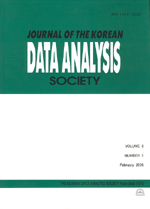Analysis of Economic Factors Affecting Propensity to Consume
- 한국자료분석학회
- Journal of The Korean Data Analysis Society (JKDAS)
- Vol.17 No.3
-
2015.061217 - 1223 (7 pages)
- 5

This paper analyzes the factors that determine average propensity to consume in Korea. Unlike previous studies that generally examined the cross country data or developed country cases, this paper utilizes the time series data of Korea to study the economic factors that affect propensity to consume. It also extends the original model of Blinder (1975) to include household wealth related variables as independent variables to analyze the factors that determine average propensity to consume in Korea. In the model, average propensity to consume is specified as the function of disposable income, income distribution, interest rate, stock price index and housing price index. The 5th quintile income ratio which is the most widely cited income inequality index in Korea is used to represent income distribution. Regression result shows that housing price and interest rate along with income distribution are significant factors that affect average propensity to consume in Korean households. Empirical result implies that an expansionary monetary policy to lower interest rates and a fiscal policy to redistribute income could raise the average propensity to consume and stimulate domestic demand.
1. Introduction
2. Analytical Model and Data
3. Estimation Results
4. Conclusion
References
(0)
(0)